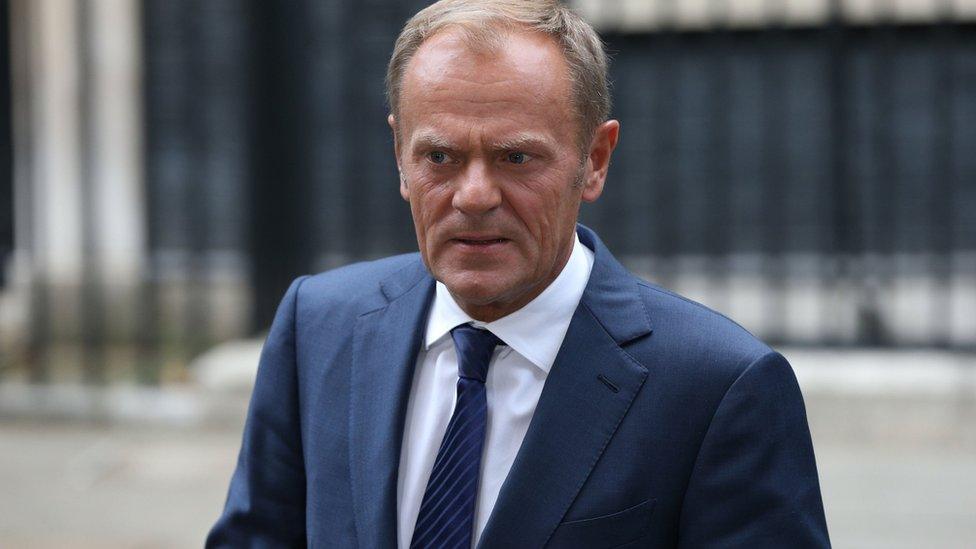Brexit: UK to wait until 'last moment' to spend on 'no deal' plan
- Published
- comments
Hammond: Not time yet for 'no deal' spending
Taxpayers' money will not be spent on preparing for a "no-deal" Brexit until the "very last moment", Chancellor Philip Hammond has suggested.
He said he was preparing for "no deal" and all other outcomes and would make money available when needed.
But he said he wouldn't take money from other areas, like health or education, now just to "send a message" to the EU.
At PM's questions Theresa May rejected claims she was ramping up "no deal" talk, insisting she wanted agreement.
"We are actively working... with the EU to ensure a good deal, the right deal for Britain for a brighter future for this country," Mrs May told MPs at Prime Minister's Questions.
One ex-minister, David Jones, has said billions should be set aside in November's Budget for a "no deal" scenario, arguing that if this did not happen it would be seen as a "a sign of weakness" by EU leaders who would think the UK was not serious about leaving the EU without a deal.
The chancellor, who has been accused of being too pessimistic about Brexit, told the Treasury committee of MPs a "cloud of uncertainty" over the outcome of negotiations was "acting as a dampener" on the economy.
He said this could only be removed by progress in the talks, which he said was dependent on the EU agreeing to discuss its future relationship with the UK as soon as possible.
He told MPs one worst case scenario for a "no deal", would see no air travel taking place between the UK and the EU on Brexit day - 29 March 2019 - but added that he did not see that as likely to happen, even if the UK/EU talks failed to reach agreement.
Writing in the Times, external ahead of next month's Budget, Mr Hammond said he had a responsibility to be "realistic" about the challenges of leaving the EU and would spend money only when it was "responsible" to do so.
Mrs May said she would not answer "hypothetical questions"
An extra £412m has already been allocated to government departments to prepare for Brexit over the next four years and Treasury sources suggested more would be made available if negotiations faltered.
Asked about the article as he appeared before the Commons Treasury committee, Mr Hammond said he was "committed" to funding departments for Brexit preparation and he was "rather surprised" that the article might be interpreted as saying that he was reluctant to do so.
"We are prepared to spend when we need to spend against the contingency of a 'no deal' outcome," he said.
"I am clear we have to be prepared for a 'no deal' scenario unless and until we have clear evidence that this is not where we will end up."
"What I am not prepared to do is allocate funds to departments in advance of the need to spend," he added.
Would it have been better if the UK voted Remain? Newsnight's Emily Maitlis presses Damian Green
"We should look in each area at the last point that spending can begin to ensure we are ready for a day-one 'no deal' scenario.
"Every pound we spend on contingency preparations on a hard customs border is a pound we can't spend on the NHS, social care or education. I don't believe we should be in the business of making potentially nugatory expenditure until the very last moment when we need to do so."
Theresa May was pressed on the issue at Prime Minister's Questions, in which former Tory leader Iain Duncan Smith sought assurances "all necessary monies" would be spent preparing for a no deal outcome.
"Where money needs to be spent it will be spent," the prime minister replied, adding that government departments would be given an extra £250m this year to prepare for a range of Brexit outcomes.
Heidi Alexander says the British people "deserve better than a prime minister simply running scared"
Labour's Heidi Alexander accused Mrs May of "running scared" of Tory backbenchers - prompting the PM to reply "the honourable lady could not be more wrong... we are not ramping up a no deal scenario".
On Tuesday, Mrs May - who backed Remain in last year's vote - repeatedly refused to say if she would now vote for Brexit, telling LBC radio: "I don't answer hypothetical questions."
At PMQs, the SNP's Ian Blackford claimed the PM "could not answer a simple question" and urged her to "come off the fence" and recognise the risk to jobs in Scotland from leaving the single market and customs union.
In response, the prime minister said she was clear the UK would be leaving the EU in March 2019 and that there would be no second referendum.


- Published10 October 2017

- Published10 October 2017